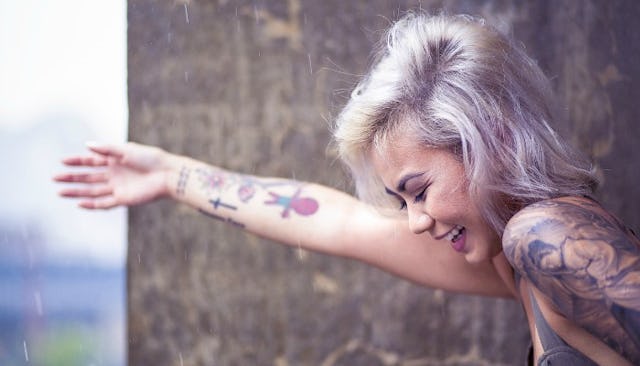I Have Tattoos And Zero Regrets

I got my first tattoo when I was 18. I went to a well-respected tattoo parlor in town with a good friend. She got a blue star on her foot, and I got a 6-inch angel on my back.
When I left the tattoo parlor, my skin throbbing under the plastic wrap taped over the fresh ink, I felt exhilarated and confident. I probably fretted for a few minutes about what my mom might say, but not much. I was confident in my decision to permanently etch multi-colored ink into my skin, and didn’t worry about whether I would one day regret my decision. Imagining what I would tell my children about that tattoo didn’t cross my mind, and the opinions of my future 40-year-old self didn’t much matter to my 18-year-old self.
I’ve heard other people admit that they regret their tattoos. Some people wish they hadn’t permanently altered their skin. Others regret the design more than its permanence. I empathize with these people. Believe me, I know regret well. Me and regret go way back. But regret about my tattoo? Nope. Not even a little bit.
Truthfully, the fact that I don’t regret that tattoo is somewhat surprising to me. Like I said, I am no stranger to regret. In fact, my MO can best be described as: Make impulsive decisions and regret them later. I was so young when I got the tattoo and it’s definitely not a design I would choose today. It’s faded a lot in the past 20 years, as well, so it isn’t nearly as pretty as it once was. And then there is the tiny issue with the angel’s foot, which looks an awful lot like a penis. Once you notice it, you just can’t unsee it. You can only chuckle.
So yeah, there are a lot of reasons to regret that large angel with a penis-foot — but I don’t. I regret many things, but getting that tattoo is not one of them.
In fact, not only do I not regret that tattoo, but I’ve gotten several more in recent years and I don’t regret any of those either. I may not love all of my tattoos equally and there are some that I wish were different, but I do not regret them. Not one bit.
“But they’re permanent!” people say. True enough. But that might be part of the reason that I love them. In an ever-changing world where few things are certain, my tattoos are a constant reminder that some things do endure. Tattoos, for me, are also a way of maintaining some levity about life and not take myself too seriously. The physical body, and external appearances in general, are far less important than what is real and true on the inside.
Others say that tattoos can have negative repercussions, like making it harder to get a job. But outdated stereotypes about tattoos and more progressive workplace environments are making it far more acceptable to display tattoos in the professional setting. According to Forbes, older perceptions about tattoos are changing as Millennials start taking prominent positions in organizations and tattoos increase in popularity in general. In fact, a Pew Research poll showed that 23% of Americans have at least one tattoo, and 32% of Americans ages 30 to 45 have one or more tattoos.
People also wonder about the message my tattoos send to my kids. Am I encouraging them to get tattoos at a young age because their mom has several of them? Perhaps. But so what? I don’t want my kids to think that what is on the outside — whether it is skin color, hair color, nose rings, or tattoos — reflects the kind of person someone is on the inside. My tattoos show them that being a good mom doesn’t mean looking or acting a certain way, but simply loving your children as only you can.
If my kids want to get a tattoo someday (when they are old enough, of course), I won’t try to dissuade them. Instead, I will encourage them to think long and hard about whether they really do want a tattoo and what they want to ink on their body. I will encourage them to think about the permanence. I will remind them that what’s on the outside doesn’t matter nearly as much as what’s on the inside. I will tell them that I love them no matter what.
And then I will ask, “Can I come with you?”
This article was originally published on